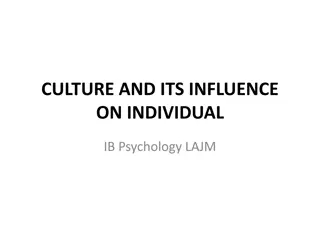The Influence of Social Context on Behavior in Social Psychology
Explore the impact of social surroundings on individual behavior in social psychology. From the power of influencers like parents, media, and peers to the shocking levels of obedience uncovered in studies such as the Milgram Experiment and Solomon Asch's Conformity research, this lecture delves into the complexities of human behavior and the ways in which social forces shape our thoughts and actions. Discover how factors like insecurity and group dynamics can influence conformity, and gain insight into the importance of understanding and analyzing social context in shaping individual behavior.
Download Presentation

Please find below an Image/Link to download the presentation.
The content on the website is provided AS IS for your information and personal use only. It may not be sold, licensed, or shared on other websites without obtaining consent from the author. Download presentation by click this link. If you encounter any issues during the download, it is possible that the publisher has removed the file from their server.
E N D
Presentation Transcript
Psychology 1200 Lecture 2
Social Psychology Can you have an independent thought or idea? Is there anything you believe that is not entirely due to your surroundings, your social situation or social context? From the day you are born, parents, media, advertising, teachers, politicians, friends, etc., influence you constantly. It is VERY important to understand that all these influencers have some interest in controlling you and your behavior. Everything we do, we do it for you Is this a na ve platitude or a way to influence and control you the consumer? How much control do we have?
Obedience: The Milgram Studies How obedient are you?
Obedience, Cont What was so surprising about these studies was that ordinary people were willing to give such high levels of shock. This experiment showed the levels of obedience that could be created even with very little coercion or pressure. This result is critical to the very basic premise of social psychology because it illustrates the importance of social context, as opposed to individual factors such as moral character, personality, freedom of will, etc. This is one reason we should be very careful about informed consent it is very easy to manipulate people! Now watch this video on some rather disturbing implications of Nazi methods to achieve conformity...be warned ok...this is, for some people, hard to watch...
How Do We Make People Conform? The most important factors to maximize conformity are: Inadequacy - Your boss says "Normally, we would require someone for this job that has a university degree. In your case, we overlooked that requirement to give you the job. By the way, is there any chance you can work late tonight to finish the proposal"? Inferiority - Good people protect others by wearing masks and getting vaccinated. Bad people don t care about the safety of others. So, only bad people would not wear a mask and get vaccinated. Insecurity - Fear of the unknown promotes insecurity. To make people conform more easily, the use of fear is a well-known method.
How Do We Make People Conform? The most important factors to maximize conformity are: Group size - The more people that are conforming, the more likely it is that an individual will conform. A good example of this case can be seen in the popular show "American Hot Rod". The boss never asked an individual to work over the weekend. He always called all the employees together in a group and asked "Who will work this weekend"? Members of the group hold similar opinions - Now, it is a common view that executives are selected because they are intelligent, creative, imaginative people that are capable of developing new business ideas. This may be true to some degree, but there is also a very strong tendency to select executives that will agree with the objectives of the CEO and board.
How Do We Make People Conform? The most important factors to maximize conformity are: Group Identity- We all want to "be like" or "identify with" other people. The more you are like someone, the more you fit in and the more likely you will be to be liked and successful. This is why the kind of suit one wears is often as important as the quality of their work. Lack of Anonymity - When others know what our opinion is, we want our opinion to conform to the majority view. Culture of Respect - We are constantly told to be a "team-player". In part, this means that we must agree with the views of other team members even if we think they are wrong.
How Do We Make People Conform? The most important factors to maximize conformity are: Status We tend to want to be like those with social status. We tend to believe people with status more than those without it. Foot in the Door - We don't ask for conformity to the ultimate objective right away. We ask for small steps along the way. Once we gain conformity to the first small step, we ask for the next step and so on. Watch this one, it's a common and very effective method. The Halo Effect We tend to assume that one desirable trait or characteristic carries over to other traits and characteristics.
An Interesting Video About The Use of Fear to Nudge People Towards Conformity
Group Interaction? Group dynamics play a very important role in group conformity and obedience. Group Polarization - Attitudes of individuals within a given social, cultural, or ideological group tend towards attitudes of the group. The attitudes of liberals tend towards the liberal friends that they associate with. Group Think - Desire for harmony in a group minimizes chances that individual's will express their own views. The problem is that, within groups, there is much, much more disagreement than we tend to think. Those that disagree stay quiet.
Group Interaction: The Classic Example The Challenger disaster watch this and identify the various aspects of conformity and obedience that lead to the disaster.
Nudge Theory! What Do You Think? Discussion question 2 focuses on Nudge Theory watch this and then we will look at discussion question 2.
Discussion Question 2 Research Nudge Theory on your own and try to relate it to the principles of obedience and conformity that we have covered in this lecture. What is a nudge? Who nudges? Why do we nudge? What does the conformity and obedience research tell us about what will and will not work when trying to nudge someone? I am here to help you translate psychological theory in to reality. That is, to understand the real-world implications and consequences of applying psychological theory in a friendship, marriage, family, community, business, or society. How would you react if your husband were a psychologist and he used nudge theory to get you to do something he wanted you to do that is, to do what is right! Explore the idea and the ethical implications of the idea. Let s try to learn something about the relationship between psychology and society ok. Have fun!























